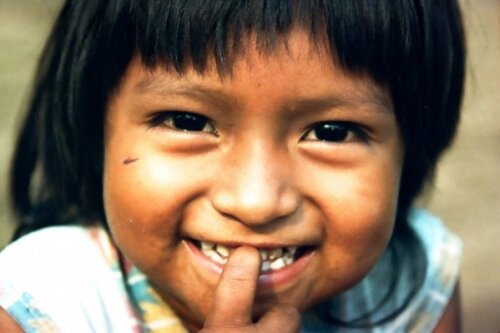Vea esta publicación en español.
The Amazon jungle area near the border between Ecuador and Peru is one of the most remote and well-protected parts of the western Amazon Basin. It is a pristine region surrounded by forests are home to at least 19 species of mammals, and 37 species of amphibians as well as 11 reptile and 250 bird species. Also in this region is an indigenous community called the Achuar or "the people of the achu palm" -- a plant that is abundant in the swamps of the area.
The Achuar still maintain their rich ancestral traditions, and for years they have made a living from subsistence agriculture, hunting, fishing, and gathering in the tropical moist forest. In 1993, these communities decided to venture into tourism as a new opportunity for economic development.
In 1996, the Achuar allied with an Ecuadorian entrepreneur to found Kapawi Ecolodge & Reserve. The hotel was built by local craftsmen using materials from the area and in a native style. About 90 percent of Kapawi's staff is Achuar, and they ensure that the hotel's operations are "ecologically responsible and culturally sensitive" according to the dictates of their own lifestyle.
After only a few years, the community project became a complete success. National Geographic named it one of the "Best Hotels in Ecuador" in 2011 and it won the Ecuador Prize of the United Nations 2010 Program for Development, the "Ecotourism Award 2002" from Skal International Tourism Professionals, and the "Ecotourism Excellence 2000" prize from Conservation International. This year, the Rainforest Alliance recognized Kapawi as a "2013 Sustainable Standard-Setter" during its annual gala in New York City.
General manager Andres Ordóñez tells us about Kapawi's success as a business, an engine of development, and a tool for preserving Achuar culture.
Question: Why did the Achuar opt for tourism instead of other activities to diversify their income?
Ordóñez : When the project began in the mid-1990s, the economic development outlook for these communities was not very positive. In decades past, there had been a lot of conflict stemming from oil exploration and exploitation. Agriculture was not a good option either due to geographical conditions, and because the local people needed nothing more than their vegetable gardens for home consumption anyway. So tourism emerged as an innovative proposal that allowed them to generate revenue, fulfill their desire for recognition, consolidate themselves as a nationality, and obtain legal possession of their lands. Moreover, it made them pioneers in the region.
Q: How have the local people benefited from Kapawi's great success?
O: More than a brand and a business, the hotel is the spearhead of the Achuar Nationality of Ecuador. Kapawi has become a tool for preserving Achuar culture and lands through sustainable tourism, which has generated many jobs and training opportunities, and has exposed these communities to the world as the guardians of the jungle.
Q: Can you expand on how the hotel contributes to the economic welfare of Achuar communities?
O: In addition to providing employment and training, the funds raised from tourist entry fees are delivered quarterly to the community for various needs. The priority is to support health and education, so money is first allocated to clinics and schools. Then the administrative costs of the six communities are divided up, and additional money is investmented in training, workshops and innovative projects, such as building the first solar canoe of the Amazon, now in the final implementation phase.
Q: Why did Kapawi seek SmartVoyager certification and Rainforest Alliance Verification?
O: Certifications and verifications help support responsible management by endorsing our hard work and reinforcing the actions the hotel is taking for sustainability.
Q: How did Kapawi's employees feel about receiving the Rainforest Alliance's "2013 Sustainable Standard-Setter Award"?
O: The news was received with a lot of excitement due to the award's international significance and because the Rainforest Alliance has been special ally of Kapawi's for many years. This award recognized the communities' management, particularly Kapawi's staff, who consider themselves to be Ecuadorians who understand the importance of sustainability. We are very proud to be one of the few companies that have sustainable tourism as the core of its operations.
Q: What are the main challenges the lodge is facing?
O: The main challenge is keeping Achuar culture active and alive, because the temptations to deviate are many. The hotel is now 100 percent owned by the community, which is a great achievement--but it also means that the owners do not yet have sufficient economic resources to recapitalize and innovate, which is essential for facing regional competition and growing costs.
Q: Is it more difficult to keep the traditional culture alive when you must adapt to the modern needs of the business, such as adopting new technologies and learning other languages?
O: As Darwin said, "The species that survives is the one that adapts to changes." Contemporary dynamism accelerates some changes, but the Achuar have maintained a relationship of harmony and respect with their land, which has been the keystone to preserving strong ties with their roots and maintaining a business based on their traditions. Technology, the internet, and learning languages are business tools that strengthen the company and help the Achuar share their culture with the world.
Q: How do you plan to maintain and improve Kapawi Ecolodge's sustainable tourism business model?
O: We have to maintain practices for cultural and environmental sustainability while working simultaneously on business model innovation. We want Kapawi's positive impact to reach more communities and boost productive development. We are already working on this and we hope to start a new phase in 2014.
Q: How has your life changed since you starting working at Kapawi?
O: I have worked in the tourism sector for 18 years and in community tourism for 10 years; however, this work is special. Working at Kapawi involves extraordinary commitment and long term dedication because we must not only meet the objectives of the business, but also support the vision of an entire people--of 7,000 people who want to preserve their culture and nature and live in harmony with it.






